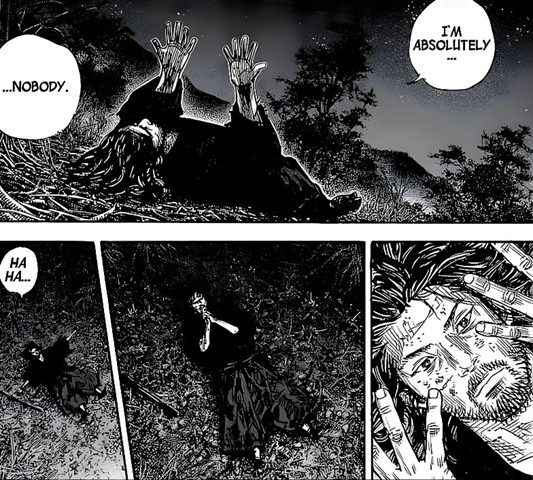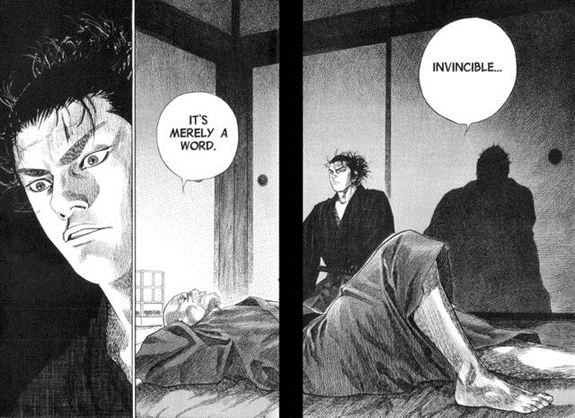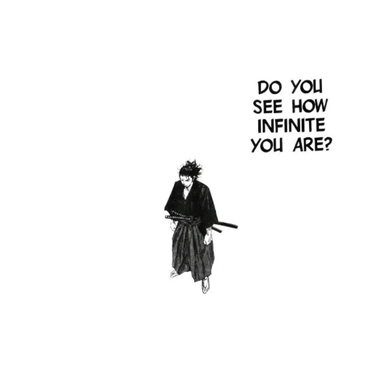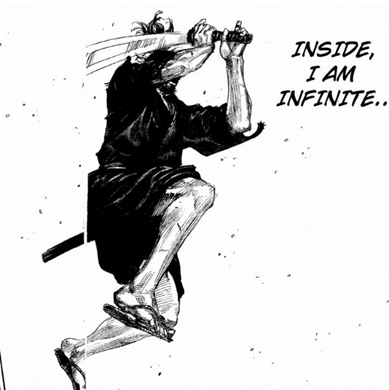Introduction
The phrase "Being invincible under the sun" attributed to Musashi Miyamoto who lived in 1584 Japan, serves as a metaphor reflecting his relentless pursuit of physical strength, rooted in a tumultuous childhood marked by war and an abusive father. Driven by a deep-seated fear of isolation, Musashi dedicates his life on making a name for himself as the strongest samurai and thus becoming “Invincible under the sun”.
As Musashi undergoes transformative character development, his dream of invincibility takes on nuanced perspectives. A crucial encounter with a monk introduces spiritual dimensions, expanding his understanding of strength beyond mere physical prowess.
Musashi's journey, from a headstrong brutal youth to a more introspective individual, unravels the layers of his quest for invincibility. Beyond martial dominance, his evolving philosophy embraces spiritual fortitude, mental resilience, and a harmonious connection with the broader cosmos.

The examination of Musashi's story delves into the complexities of his pursuit and its intertwined connection with his spiritual awakening!
Zen Buddhism
"Letting go of yourself, leaving yourself and everything yours behind you so decisively that nothing more is left of you but the purposeless tension." -Zen In the art of achery. (Masucci, 2016)
The connection between Musashi's journey and Zen Buddhism may seem elusive at first glance. However, at the core of Zen Buddhism lies the goal of detachment, liberating the mind from all attachments, to foster openness to any experience.
Understanding this paradoxical idea can be challenging.
According to Zen teachings, the mind and body are transient and ever changing, constantly influenced by external circumstances and internal thoughts. By detaching oneself from these fluctuations, one seeks to uncover a deeper understanding of existence. In Zen Buddhism, detachment does not mean dissociation or indifference but rather a profound acceptance of the impermanent nature of existence. By letting go of attachment to desires, expectations and the ego, it is possible experience a profound sense of freedom and peace.
Ultimately, Zen Buddhism teaches that true liberation arises from transcending the dualistic distinctions between self and other, mind and body and embracing the inherent wholeness of your existence.
“Preoccupied with a single leaf... you won't see the tree. Preoccupied with a single tree... you'll miss the entire forest. Don't be preoccupied with a single spot. See everything in it's entirety... effortlessly. That is what it means to truly see’’ - (Takehiko Inoue Quotes (Author of Vagabond, Vol. 1), z.d)
By detaching himself from the world, Musashi attains a profound self-understanding that was
previously elusive.

By adapting his ideology into his swordmanship, Musashi achieves a state of Zen. In this detached state, he gains a heightened understanding of everything, enabling his body to move instinctively. Musashi becomes adaptable to any situation or fight, seamlessly flowing with the rhythm of life without thinking.
The pupil must develop a new sense, or more accurately, a new alertness of all of his senses. This will enable him to avoid dangerous thrusts as though he could feel them coming. Once he has mastered this art of evasion, he no longer needs to watch with undivided attention the movements of his opponent or even of several opponents at once. Rather, he sees and feels what is going to happen, and at that same moment, he has already avoided its effect. Without there being a hair's breadth between perceiving and avoiding, this then is what counts: a lightning reaction which has no further need of conscious observation. -D.T. Suzuki (Zen in the Art of Archery, Herrigel Eugen | 9781941129944 | Boeken | Bol, 2018)
Similarities with mindfulness?
Central to Zen philosophy is the practice of mindfulness, which involves observing thoughts, emotions, and sensations without judgment or attachment.
Through meditation and mindfulness techniques, individuals learn to cultivate a state of present-moment awareness, allowing them to transcend the limitations of the ego and connect with the underlying unity of all things.
Invincibility is nothing more than a word
Having mastered the state of Zen or emptiness and defeating over numerous enemies, Musashi sets his sights on challenging a legendary sword master to claim the title of "invincible." He discovers the elderly swordsman vulnerable and asleep in his castle. Musashi, to his surprise finds himself unable to strike the fatal blow. In a critical moment, his perception of invincibility undergoes a profound shift.
Musashi envisions the elderly master as awake, capable of defeating him through sheer willpower alone.
Overwhelmed by admiration and fear, Musashi abandons his lethal intent and flees, being filled once again with self-doubt.
Musashi's relentless pursuit of the title "invincible under the sun" reveals a deeper theme. The quote implies that being called "invincible" is just an empty title without any real significance. Obsessively chasing such a title, mirrors the misery that plagued Musashi's father, a perpetual struggle marked by insecurity and anger in preserving the title of invincibility which even lead to the abusing his son.
Beyond the confines of the manga, this narrative imparts a broader lesson, cautioning against blindly seeking validation through titles.
Instead, it advocates pursuing endeavors for genuine passion, independent of the need for external recognition.
Invincible...It's merely a word.
The more you think about it, the more you squint your eyes in desperation to see... the more obscured the
answer becomes. -Yagyu, the swordmaster (Read Vagabond Manga online, 2023)

Infinite
Musashi's dad trapped himself with the idea of being invincible, which made him abusive and ruthless due to the fear of someone robbing his title. The lesson here is that Musashi's dad got too limited by this goal of being "invincible." The sword master teaches that it is just a word, nothing more.
Instead of getting stuck on meaningless words like his father did, Musashi should remember he's infinite inside. He doesn't have to be obsessed and held back by one empty word that consumed his father. Using the word "invincible" held Musashi back from growing. He should have been thinking about being infinite.
By not limiting himself with meaningless words, he could become limitless...

If the properties of gravity were not precisely as they are presently, our existence wouldn’t persist. The evolutionary trajectory of certain species, including humans, hinges on specific adaptations, had these not occurred, our existence would be improbable. The sun's temperature, in its exact configuration, is indispensable to our existence etc...
Despite our inherent connection with the cosmos, there persists a prevalent sense of disconnection. Paradoxically, while our influence on the world is profound, our individual significance within the universe appears negligible. Only by embracing a state of Zen or emptiness in our contemplation can one transcend this paradox. By liberating oneself from earthly attachments, including the corporeal form, a moment of profound emptiness ensues.
In this state of emptiness and receptivity to the world, one attains a realization of their true infinity...

Sources:
Read Vagabond Manga online. (2023, 11 december). Vagabond Manga Online. https://ww2.vagabond-manga.online/?2023-12-11
Book of Five Rings, Miyamoto Musashi | 9781590302484 | Boeken | Bol. (2005, 11 januari). Bol.com. https://www.bol.com/be/nl/f/the-book-of-five-rings/30122679/
Zen in the Art of Archery, Herrigel Eugen | 9781941129944 | Boeken | Bol. (2018, 8 januari). Bol.com. https://www.bol.com/be/nl/p/zen-in-the-art-of-archery/9200000088155787/?bltgh=nxEjQxnV4IkmVUeXP01OhA.2_15.16.ProductImage
Masucci, M. (2016, 26 april). Quotes from Zen in the art of Archery. Independent Society. https://indso.com/zen-in-the-art-of-archery/#:~:text=Like%20all%20mysticism%2C%20Zen%20can,no%20right%20to%20demand%20anything
Takehiko Inoue Quotes (Author of Vagabond, Vol. 1). (z.d). https://www.goodreads.com/author/quotes/147221.Takehiko_Inoue

Reacties